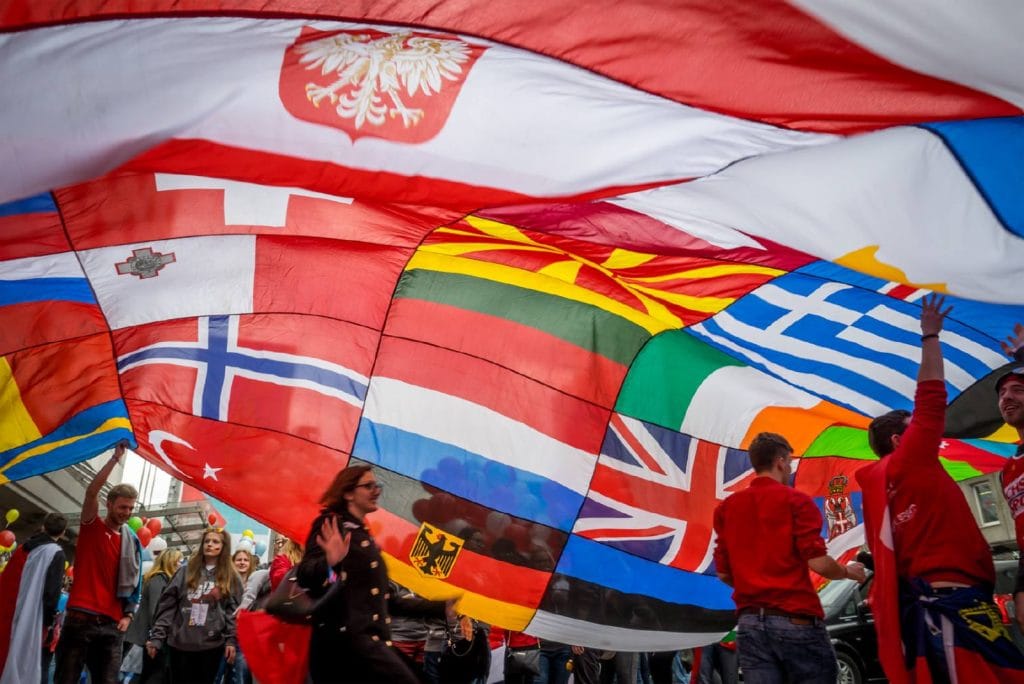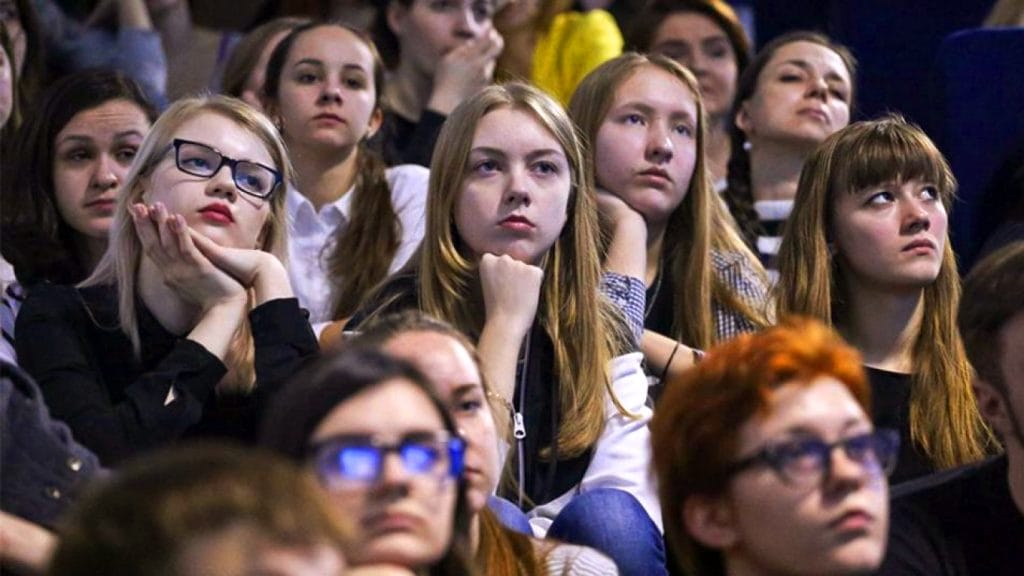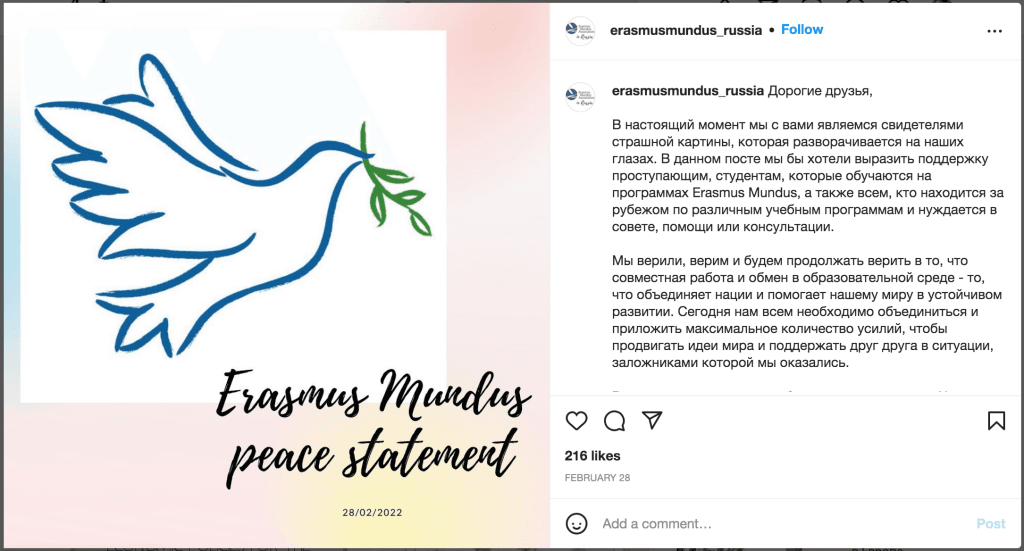With the outbreak of events in Ukraine, reports began to appear about discrimination against Russian students abroad - from expulsions from foreign universities to non-recognition of Russian diplomas. We checked how true these messages are.
Expulsions of Russian students from European universities
Just four days after the events began in Ukraine, Human Rights Ombudsman Tatyana Moskalkova stated on the expulsion of Russian students from universities in France, the Czech Republic, Belgium and other European countries in connection with the situation in Ukraine. Her words replicated dozens of Russian media.
Anxious Russian student at the German Bauhaus University in Weimar called to the dean's office to find out whether the rumors about expulsions that he had read in the Russian media were true. The university hastened to publicly reassure all Russian students, declaringthat “the university is on your side.” Many European universities did the same and, contrary to Moskalkova’s statement, organized support measures for their students from Russia.
Universities in the UK contact with Russian students to provide them with emotional support. For example, Cardiff University staff calling students from Belarus and Russia to check if everything is in order. "We have a duty to all our students, wherever they come from, and students cannot be held responsible for the actions of their president," said the university's vice-chancellor, Professor Colin Riordan. And the President of the Association of British Universities, Professor Steve West said: “We will support all our students, no matter where they come from. Education brings us together and promotes mutual understanding. The rulers who are trying to destroy it must be stopped.”

Newcastle University wrote in a press release that “our thoughts are now with everyone who has suffered from the conflict: with the citizens of Ukraine forced to leave their homes for safety, as well as with the citizens of Russia who courageously resist the war, exposing themselves to great risk.” In a similar statement from the University of Sunderland it says: “We are working to help our Ukrainian and Russian students, as well as all members of the university community who have been affected by recent events.”
In Belgium, the rector of the Catholic University of Leuven, Luc Sels denied rumors about the expulsion of students from Russia and accused Russian pro-government media of spreading fake news. Vilnius University also condemned disinformation and statedthat discrimination based on nationality is unacceptable. Rector of Masaryk University in Brno spoke with a speech in support of Russian students, and the Dean of the Faculty of Social Sciences at Charles University in Prague said, that “students from Russia and Belarus are still welcome at the faculty.”
European University Association refuted statements about the expulsion of Russian students, and the organization "Universities of France" threatened legal action if allegations of discrimination are repeated. University of Berlin Humboldt and the Technical University of Berlin also stated, that although they have suspended joint research projects, Russian undergraduate, graduate or doctoral students will not be affected. Representatives of the European Union student exchange program Erasmus+ also reportedthat information about deductions is not confirmed.
Only two calls for the expulsion of Russian students are mentioned in the media. First entered from Sussex University professor Paul Nightingale, but it concerned exclusively the children of Russian oligarchs and, most likely, was rhetorical. The second call came from US Congressman Eric Swalwell, who suggested expel Russian students in retaliation for Russia's invasion of Ukraine. The idea is widely criticized The media and Swalwell's colleagues, and to date there is no evidence that universities supported the proposal.
Adding to the denials from universities and educational associations are statements from students studying abroad themselves. Firstly, in the comments under Moskalkova’s Instagram post, Russian students of European universities wrote, which, on the contrary, receive words of support and offers of help from their educational institutions. A student at the Czech Technical University, from which, according to Moskalkova, Russian students were allegedly asked to expel, said: “In Russia, information is being spread that we are being expelled from universities - this is absolutely not true. We ourselves got scared when we saw this news and went to find out. Yesterday I received a letter in which they clearly and clearly explained that they would not expel anyone just like that.”

Lecturer at the University of Sheffield in the UK, Russian Ilya Yablokov confirmed, that expelling students from British universities on the basis of nationality is simply impossible “because there are working laws.” He suggested that some Russians believed Moskalkova’s words because “many in Russia do not understand how life works outside its borders. They are driven by the idea that in other countries everything is the same as in ours. Accordingly, you can create chaos and expel a person from school or work out of the blue.”
A student at the Technical University of Dortmund spoke in a similar way: “In Europe, expelling someone because of their nationality or without good reason is a judicial matter. If tomorrow I receive an order to expel, then I just take all my clothes, go to court, definitely win, and the university suffers financial and reputational losses. So, when people write such fakes, they are probably measuring the whole world by themselves. They apparently think that if they can expel students on one day because of going to rallies, then it will also fail here. But it won't work here. I can’t even imagine how a rector who signs such a suicidal order must be overcome.” Interviewed Russian students from universities in 16 countries refuted reports of expulsions, while many declared moral and even financial support from universities, classmates and teachers.
Not true
Russians can no longer participate in student exchange programs or receive foreign study grants
Some sources write, that because of the hostilities in Ukraine, foreign universities, scientific communities and international foundations, which issued grants and scholarships to Russian students to study abroad, began to voice refusals to cooperate with Russia.
Some scientific exchange funds have indeed announced the termination of cooperation with Russian institutions. For example, the German DAAD Foundation, which is involved in student exchanges, wrote on the termination of consideration of applications from Russian applicants for grants and scholarships. Also, German universities are suspending all project activities with Russia financed by DAAD. “We must recognize that we are facing a serious challenge in the field of foreign policy, defense and security. A challenge that we have not seen in Europe in this form since the Second World War and which destroys the foundations of European values,” said DAAD President, explaining the decision to stop cooperation with the aggressor country.
So far, there have been no official statements that the Erasmus+ student exchange program is winding down its activities in Russia, neither from the EU Delegation to Russia, nor from the European Agency for Education and Culture, which is responsible for funding Erasmus Mundus programs. Russian Erasmus+ office wrote on Instagram that the issue of ending the exchange program is not on the agenda. And the Erasmus student network emphasizedthat “young people in Russia are not its government. They also suffer the consequences of decisions that undo the work done by civil society organizations in Russia. Russian students abroad should also receive support during this difficult time for them.”

Some Russian figures in the field of education warnthat numerous programs of the British Council, the Goethe Institute, the Cervantes Institute, Alliance Française and other organizations that provide scholarships for studying abroad for Russian students are at risk. These programs are funded by the governments of these countries through foundations and will most likely be closed. As a result, Russia may lose the methods of passing the TOEFL and IELTS exams, which were conducted in a common format by these foundations, which means that it will become more difficult for Russian students to enroll in Western universities. However, so far there have been no announcements about the cessation of these organizations. And, by words Since several agencies and scholarship funds help Russians enroll in hundreds of different foreign universities, Russian applicants and students have not encountered problems in obtaining scholarships and grants in any country.
Mostly not true
Diplomas from Russian universities are no longer recognized worldwide
March 13, 2022 Telegram channel of the Verkhovna Rada of Ukraine wrotethat diplomas from Russian universities are no longer recognized in the world. On the same day the news hit headers The media and spread throughout forums And social networks.
In a message from the Verkhovna Rada explainedthat the Triple Crown associations (AACSB, EFMD and AMBA) decided to withdraw accreditations from Russian universities. Actually published on the AACSB website statement on behalf of the four associations: “We have made a collective decision to suspend all membership and accreditation activities of Russian institutions until further notice. For students, accreditation remains valid. Previously awarded degrees will continue to be considered to have been issued by accredited institutions.”
By statement Russian Association of Business Education, this only means that the issuance of new accreditations and re-accreditation is frozen, and “the existing accreditations that have been received by leading Russian business schools remain in force. They are confirmed as accredited and have every right to post information about accreditations on their websites, as well as communicate their availability to their clients.” One way or another, the suspension of the activities of the Triple Crown associations does not affect the recognition of diplomas from Russian universities. That is, this measure relates only to the status of individual universities, and not to the students themselves and their diplomas.
Not true
Update 03/21/2022: Although the statements of the University of Tartu and some other Estonian universities concern only applicants, and not students from Russia, the topic has gained popularity in the context of the oppression of Russian students by foreign universities, and we decided to also include it in the selection.
Some Estonian universities will ban the admission of Russians
Many publications wrote about decision Tartu and some other universities in Estonia do not accept applicants from Russia who do not have a residence permit or long-term visa in an EU country.
Vice-Rector of the University of Tartu Aune Valk indeed statedthat in the 2022/2023 academic year the university will not accept new students from Russia and Belarus. The decision was also supported by the Tallinn Technical University: “The last straw was the statement of the rectors of Russian universities who supported Russia’s attack on Ukraine,” said Vice-Rector of TTU Hendrik Woll.
At the same time, universities emphasize, that for now we are only talking about the 2022/2023 academic year. In addition, the restrictions will not affect:
- Russian citizens living in Estonia with a long-term visa or residence permit in EU countries;
- Refugees from Russia and Belarus;
- Russian students who are already studying at Estonian universities and want to continue their studies at a bachelor's degree, and, if desired, at a master's degree.
However, many people expressed their protest against the restriction students, sociologists and employees of Estonian universities. About two hundred teachers from five Estonian universities, including the University of Tartu, wrote in a collective letter that this step would be perceived as a signal of isolation. “In the interests of Estonia and the whole world, on the contrary, supporting the foundations of democracy and the spirit of freedom in Russia and Belarus should take first place,” the letter says.
April 4, 2022 in the Senate of Tallinn University decide, whether to admit citizens of Russia and Belarus for the 2022/2023 academic year. At the same time, the rector of Tallinn University Tõnu Viik said, which does not support restrictions because they are contrary to the basic values of a democratic state.
And finally, the President of Estonia, Alar Karis, who formerly served as Rector of the University of Tartu, said, which considers the decision of the University of Tartu controversial and hopes that it will be reconsidered.
Mostly true
Read on the topic:
- How Russian students are now studying abroad
- Fake news about what is happening in Ukraine
- Fake news about what is happening in Ukraine. Part 2
- Fake news about what is happening in Ukraine. Part 3
- Fake news about what is happening in Ukraine. Part 4
- Fake news about what is happening in Ukraine. Part 5
If you find a spelling or grammatical error, please let us know by highlighting the error text and clicking Ctrl+Enter.






